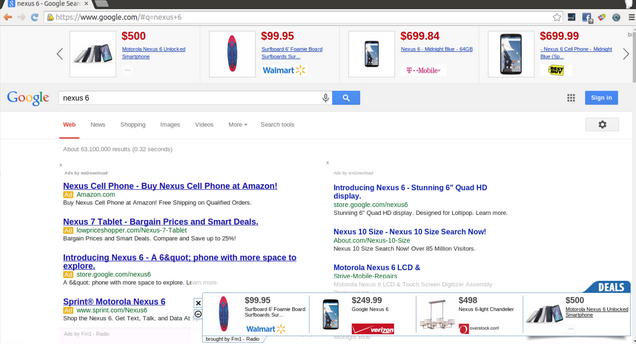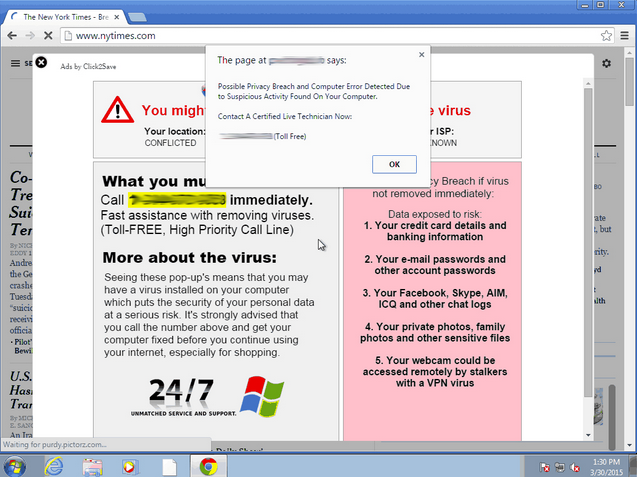Search kingpin Google Inc. (NASDAQ:GOOGL) has recently banned 192 Chrome extensions that affected almost 14 million Chrome browser users, after a research group from University of California, Berkeley studied the ad injectors and deduced a device that could catch these bad extensions. To make Chrome experience safer, Google is trying to get rid of the ‘ad injectors‘ that hampers searching.
Ad Injectors are a kind of programs that are injected by force into a web browser. The issue of Ad Injector has come into prominence via more than 100,000 complaints from Chrome users as compared to complaints about network errors, performance issues or any other problem.
Injectors are a class of unwanted software that installs itself on the browser, and track down user information. These programs are deceptive and nearly impossible to remove once installed. They come equipped with bundles of download that cause harm to the users.
Ad injector, however, is not exactly like malware. Rather it shows up an ad that actually doesn’t belong there. This is what happened with Lenovo’s Superfish ad injector. It ended up creating a huge number of security issues for Lenovo users. Microsoft and Mozilla users faced a lot of trouble due to Superfish ad injector. Users had no idea how and when the superfish software got installed on their machines before they faced the annoying intrusion of these injectors while browsing a content.
Some of the major findings in the research are:
- All Operating systems (MAC and Windows) and browsers (chrome, Mozilla, IE) were victims to ad injectors.
- More than 5% of people visiting Google have at least one ad injector installed. Around two third has four and half of the people have two ad injectors running simultaneously.
- Almost 35 percent of chrome extensions injecting ads were declared as outright malwares.
Ad Injectors pose threat to advertisers and publishers as well
Google mentions clearly that ad injectors are not a part of a healthy ad ecosystem. Rather its presence causes harm not just to Google users but also to advertisers and publishers. Many-a-times, most advertisers are unaware that their ads are being used an injector.
It is a common psychology to hate ads because they cause trouble in viewing the page content. They are intrusive and annoying. Despite that, most people are prone to clicking them, giving way to these injectors to take up a comfortable place in their browsers.
Not only advertisers, but publishers also fell victim to the ad injectors. For instance, last year Walmart.com, that doesn’t sell any ad spaces, saw the intrusion of an ad that took the central position on the web page.
These are mainly forced into the websites by third parties illegitimately. The main purpose of these third parties is to make some extra money! They inject ads in websites of some of the top publishers as extensions that enables seamless video streaming or downloading, or probably both. As highlighted by online video security firm Telemetry, 251 Apps, an ad injector operation, consequently affected some of the globally renowned publishers like YouTube, Weather.com, Yelp, MSN and Yahoo! Inc. (NASDAQ:YHOO)
Is a permanent eradication possible?
While Google has made many recent announcements about fighting these intrusive ad injectors, and is consequently slated to publish a detailed report on May 1st, 2015 to increase awareness about these malicious extensions.
In Chrome, there are various Developer Program Policies that the Chrome web store has to comply with. This states that every extension on Chrome has to have a narrow and easy to understand purpose. Google clearly states that they are not against every single injector.
There are many companies that willingly inject ads that are relevant to what they do. Google has no problem with such injectors. However, those injectors that creep into users’ browsers are highly detested. To make things plausible, Google does show warnings in red to its users when they are to download any suspicious software or the APIs used to interact with browsers are not right.
Similarly for ad advertisers, Google does not allow programs that take up ad space without the prior permission of the website owners.
You might ask how do these ads enter the ecosystem? Philadelphia-based ad server and exchange called RightAction is known to make way for these ads into the ad ecosystem. According to RightAction, not all toolbar or plugins are bad. They prefer to call these ad injectors perfectly legitimate. Like 251 Apps, RightAction is also a commercial ad injector operation.
In the digital ad industry, while some call ad injectors intrusive even if they are relevant and has the company’s consent; the others don’t think they are illegitimate as long as they do not violet any terms.
As of now, Google along with other browsers are now busy finding a technical solution to get rid of the unwanted software permanently. Until a solution comes up, web users will remain open to such attacks from third parties.




